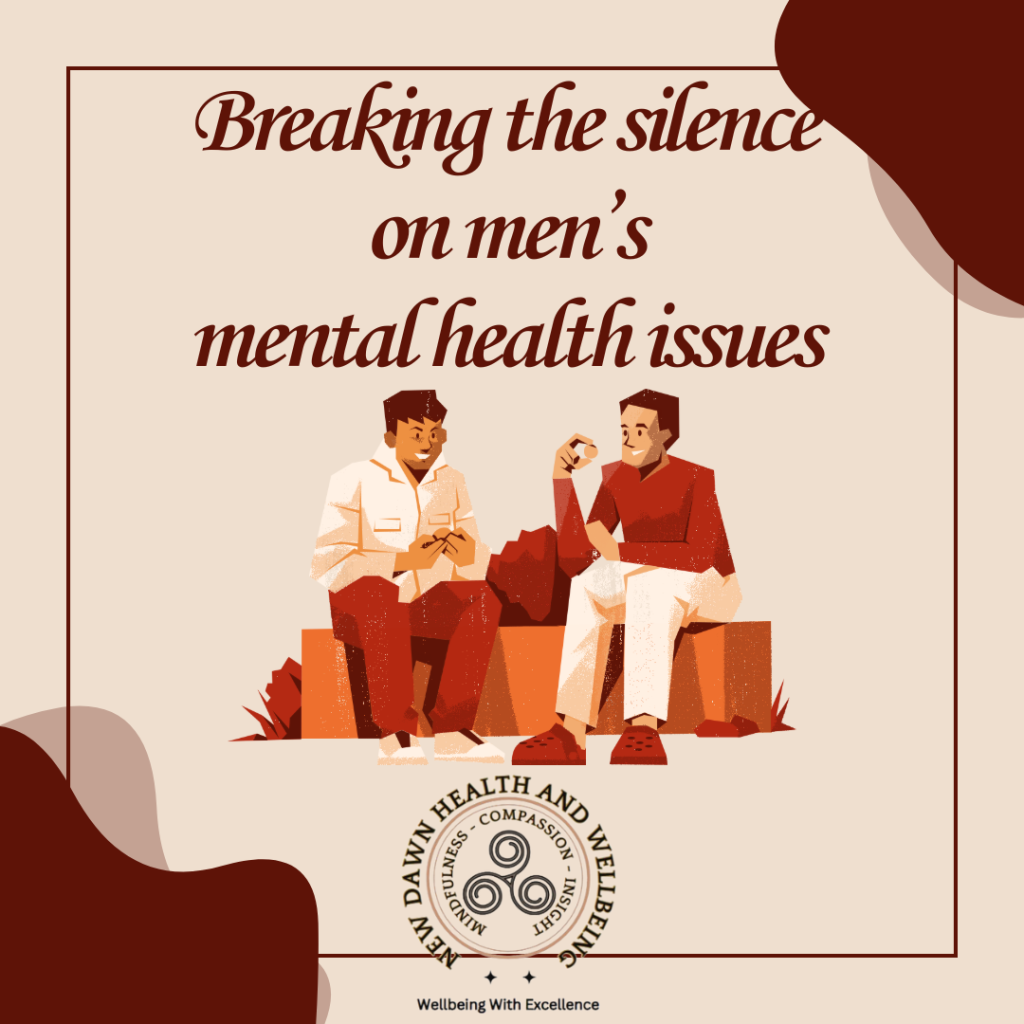Men’s mental health, lets break the silence

As man who has faced his own mental health problems, anxiety, depression, suicidal ideation, addiction and who works with men on a regular basis, I feel I understand the challenges many of us men encounter.
One in eight men suffer from anxiety or stress. However, we could say these figures are low due to men not coming forward to discuss their concerns. Why is this?? Stigma, fear of not being heard, fear!!!
I intend to explore these issues and provide tips on how to overcome them in this two-part blog.
As we enter men’s mental health month, let’s take a moment to reflect on what that means!!
I had the privilege recently to attend a live podcast session hosted by the lads from the “Are you well” podcast. Well worth a listen. During the evening there were a lot of laughs, good fun and a nice sense of connection from the lad’s easy and welcoming approach. More importantly, however, men were coming together to talk about thoughts and of course for men, (sometimes) dreaded feelings.
I was extremely pleased to be accompanied by my son, my father-in-law and a good friend, three generations of men, all with different experiences of what it is to be a man. During the event, there was an exploration of being parented by men from an older generation, men who didn’t express emotion and didn’t know how to in many cases, unless it was sternness or anger. As far as I can recollect, the only time I saw my father cry was at his mother’s funeral. A lot of the time as a young man I only cried when I drank too much, which was often. watching my dad express emotion, I didn’t know what the hell to do, it was something I had never witnessed before. So no doubt I awkwardly tried to comfort him. Thinking of my dad, I remember a man who loved a hug, a hug with a vice like grip as if he didn’t want to let go. Anyone that knows me may recognise a similar type of hug.
The aim of the live podcast event was to highlight men’s mental health, raise some funds for “Movember” and get men talking about how they feel which I think they succeeded in greatly. I know I did, as did my fellow companions on the night, it was interesting to hear their experience of the event on the way home and days later. How they each interpreted it, accepted or rejected the concepts in their own ways.
As for men in general, If we look at the areas mental health encompasses, emotional, psychological, and social well-being, all affecting how us men think, feel, and behave. Our wellbeing has a direct influence on how we handle stress, relate to others, and in the choices, we make, be they helpful or unhelpful.
The sometimes unspoken challenges faced by men
• Societal expectations of strength and stoicism
• Reluctance to seek help or express emotions
• Higher rates of substance abuse due to escapism to substance use.
• Greater risk of suicide
• Work-related stress and pressure
• Difficulty maintaining social connections, cancelling plans, taking sick days.
Perhaps it’s from a young age that we are taught to suppress how we feel that we have to be resilient, self-reliant. One of e speakers from the weekend likened it to being born, disconnected from the womb, disconnected from being nurtured and out in the cold harsh world to stand our own two feet and maintain that masculine facade.
It’s all a variety of heavy-duty issues for us to get our heads around. Where do these challenges stem from you might well ask? Well, it can be seen that they originate from cultural norms that actively discourage men from showing vulnerability. Think of all the movies you grew up watching, what did that inform us of being manly? For me, it was Stallone, Russell, Schwarzenegger. Manly men alright.
The stats tell us that nearly one in eight men experience anxiety or depression daily, but less than half seek treatment. The harsh reality is that we all experience worry, stress and low moods, we all have mental health problems, sadly us men don’t reach out and ask for support in time or at all.
Here are some handy tips to help with this area:
Recognise emotions
Identify and name your feelings, understand it’s normal and healthy to experience a range of emotions. Know what you are working with. I have named my helpful thought butterflies and unhelpful thought wasps.
If a butterfly flew in through an open window, hopefully we would admire it, and help it outside and on its merry way. If a wasp flies in?? In the past I have smacked it down straight away, now I tend to get it outside as quickly as possible.
Lets do the same with our helpful and unhelpful thoughts, admire the helpful ones and allow the unhelpful to buzz off as quickly as possible.
Practice self-reflection
Set aside time to think about your mental state. Journaling can be a very helpful tool to do this, notice how you are feeling etc.
Start small
Begin by sharing minor concerns or feelings with trusted friends or family members. See last weeks JOHARI window blog for more details.
Use “I” statements
Express yourself using phrases like “I feel” or “I think” to own your emotions.
And of course, seeking professional help is always good, consider talking to a therapist for unbiased support and guidance.
Thank you for reading, there will be a part two of this next week.

